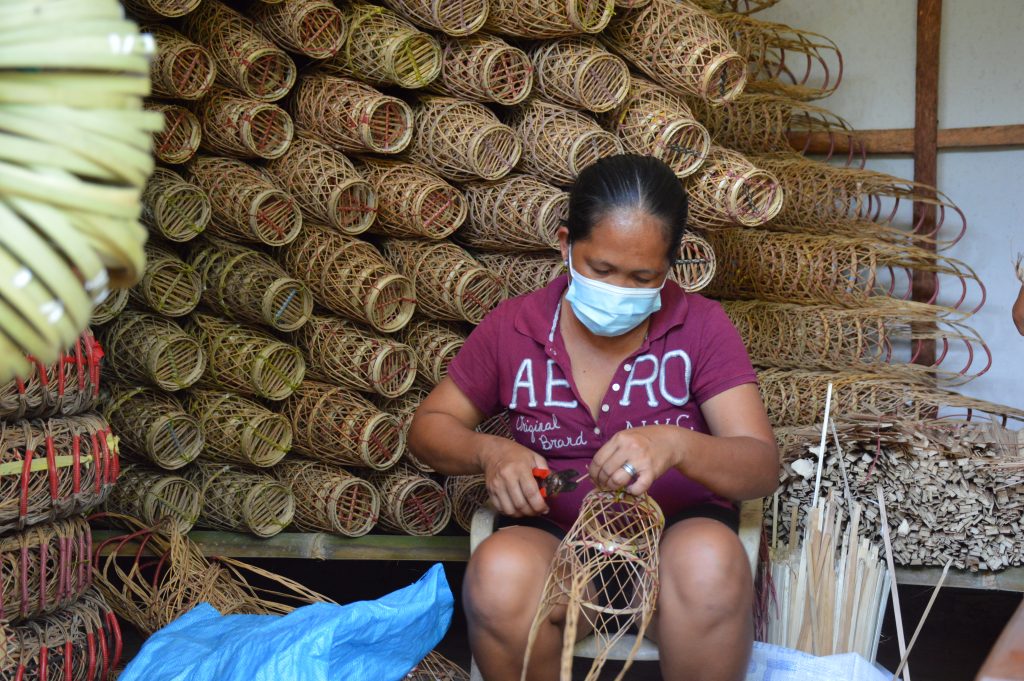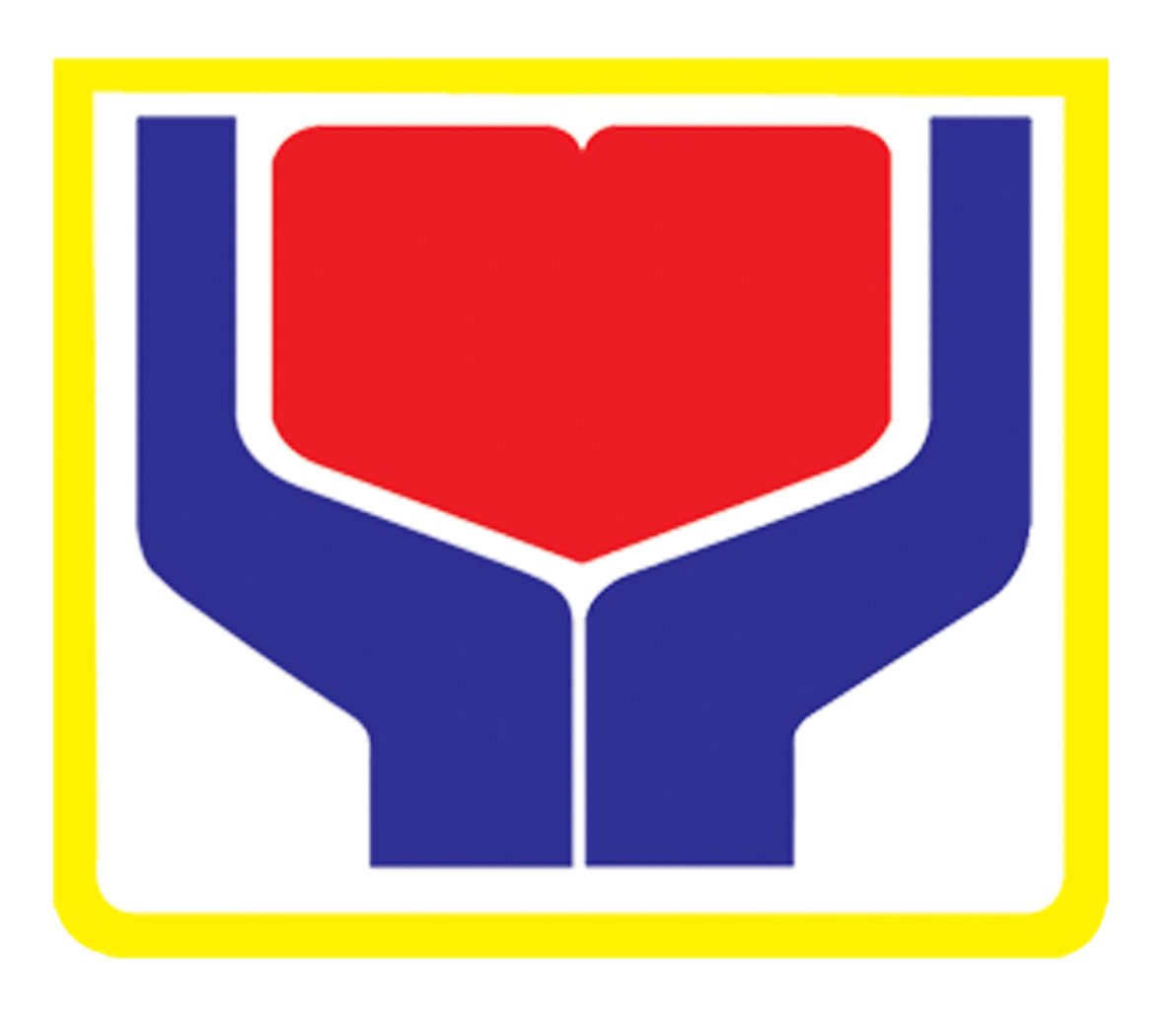Women working together to lift each other’s burden.
It takes a skillful pair of hands to weave a basket, but it takes a community’s collective conviction, hard work and dreams to ensure this handicraft does not become a burden.
In the rural community of Doña Aurora in the town of Calauag in Quezon Province, basket weaving has been a source of income for a number of households, especially among women members of the community, for years now.
“Malaking tulong po ang paggawa ng basket sa aming pang-araw-araw na gastusin, pero walang kasiguruhan na tuluy-tuloy ang kita dahil kulang kami sa puhunan,” shared Rowena Resaba, 49, a solo parent with five children.
Rowena’s story is common to the women in the community.
“Dahil wala akong puhunan, nakikigawa lang ako ng basket sa mga mayroong puhunan. Ang bayad lang sa akin ay salapi [50 centavos] kada basket,” said Adora Arias, 39, who started learning to weave baskets so she can help her husband to support their seven children.
Though the income from basket weaving is small and irregular, the women of Doña Aurora have no choice as they want to be productive as possible and help in the finances of their respective households. After all, this is a source of income that they can do in the comforts of their homes while taking care of their small children.

Receiving help for their families
With their financial situation, the families of Rowena and Adora became beneficiaries of the Pantawid Pamilyang Pilipino Program in 2014.
This Pantawid Pamilya is a program of the national government that provides conditional cash grants to qualified poor families to support the health, nutrition and education of zero to 18 years old children.
“Malaking tulong po ito sa akin na single parent, malaki ang kaluwagan na mayroong umaalalay lalo na sa pangangailangan sa school ng mga bata,” shared Rowena.
Adora, on the other hand, shared that the financial assistance from the program helped ensure her children’s attendance in school as their combined alone is often not enough to meet their daily needs. This basket weaving is Adora’s income while her husband only earns income as a tricycle driver.
“Dati po talaga, dahil kulang sa pinansyal, malimit na hindi na lang pumapasok ang mga anak ko,” she shared.
Both mothers made the assistance from the program an inspiration to work harder for their dreams for their children.
“Minsan inaabot ako ng madaling araw sa paggawa ng basket lalo na kapag kailangan ng mga anak ko ng pandagdag sa gastusin sa school. At kung may pagkakataon, nagsa-sideline din ako kapag may nagpapalinis ng bahay o kaya ay nagpapaupa sa pagpitas ng mga prutas,” said Rowena.
As part of the interventions to qualified family-beneficiaries of the Pantawid Pamilya, the beneficiaries in Dona Aurora were provided with livelihood opportunities under the Sustainable Livelihood Program (SLP).
The SLP aims to improve the socio-economic status of poor families through the provision of seed capital fund for micro-enterprise development or through skills training for employment facilitation.
Rowena, and Adora were among those identified Pantawid Pamilya grantees in their community who formed an association for their handicraft-making micro-enterprise.
Earning together for their families
The association, which is composed of 30 beneficiaries, all are women, received capital seed fund of PhP15,000 per member. These seed capital were pooled together as the association’s fund. Their group, which they named Pinagpalang-kamay SLP Association, received a total of PhP450,000.00 as starting fund for their business.
“Problema talaga ng mga kababaihan dito ang puhunan kaya dito sa SLP, kaya naisip ng aming grupo na ang pondo nalipon ay ibibili namin ng mga materyales sa paggawa ng basket at ipapasa sa murang halaga sa mga miyembro at kahit sa mga hindi miyembro,” said Rowena, who is elected as the association’s treasurer.
Adora cannot be more grateful because being a member of the association means she can get raw materials without having to pay in cash upfront. Like other members, she gets PhP800-worth of raw materials, makes these into 300 pieces of baskets and sells these to the association for PhP4 each piece.
“Kapag nagbebenta ako dito sa grupo, yung napagbentahan ko, doon na nila ibabawas ‘yung halaga ng kinuha kong materyales. Mas malaki na rin ang naiuuwi kong pera para sa pamilya ko,” shared Adora.
Rebecca Abasolo, 53, the association’s president, also shares that their group makes it easier for members to earn money.
“Mura ang benta namin sa mga materyales kasi bultuhang binibili ng grupo. Noon kasi, kapag indibidwal kaming bibili, mas mahal naming makukuha at kailangan pang maghintay na may pumuntang supplier para makabenta ang kada bahay. Ngaun, p’wede na silang magbenta ng natapos nilang basket araw-araw sa amin.” shared Rebecca.
With this setup, members and even non-members in the community can earn on a daily basis.
“Kapag masipag kami, siguradong may kita araw-araw para sa aming pamilya,” said Rebecca, who added that members can earn even more through selling to the association raw materials such as bamboo and spines of coconut leaves (tingting).
Since the start of their operation last February 2021, the association is able to buy a small lot, build a small stock room (bodega) where they store the raw materials and finished baskets, and sell at least 1,000 baskets per week.
“Ang pangarap po talaga namin dito ay mas mapaunlad pa itong livelihood para mas makatulong sa mas maraming kababaihan,” said Adora.
“Ang kailangan lang talaga ng bawat isa ay maging aktibo at tumupad sa responsibilidad ng bawat isa sa asosasyon,” Rebecca asserted.
With everyone’s contribution, little by little, they are making this handicraft business a source of hope and inspiration not only for their families but for their community.***
